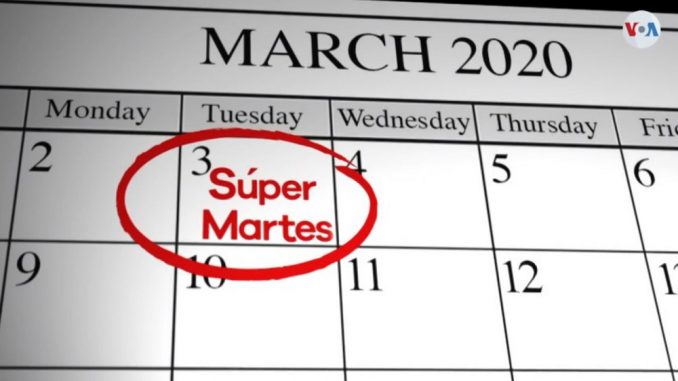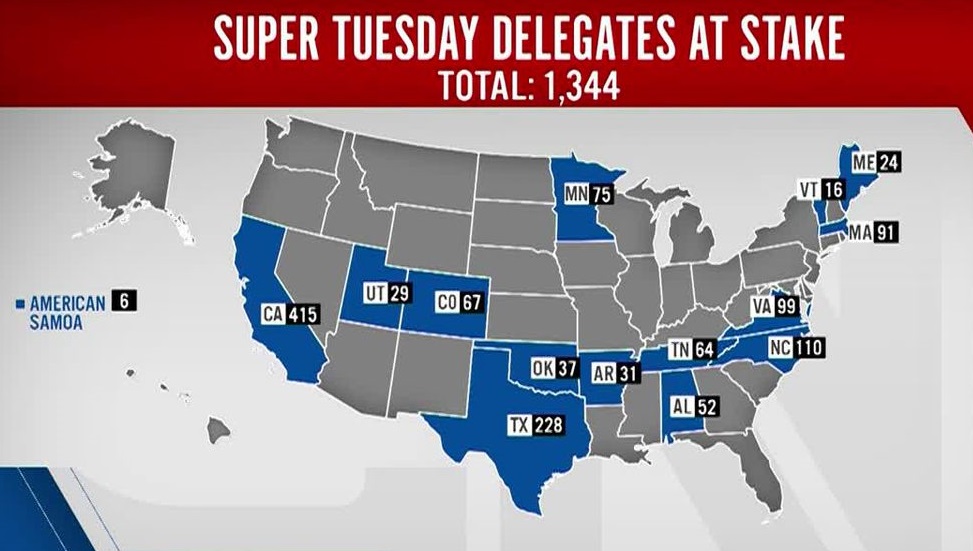
By Luis Meiners
Fourteen states and 1357 delegates for the Democratic Party National Convention were at stake on Super Tuesday. Biden won in 9 of the 14: Alabama, Virginia, Tennessee, North Carolina, Oklahoma, Minnesota, Arkansas, Massachusetts and Texas, and was leading a tight race in Maine. In addition to the Southern States where he had been leading the polls, Biden managed to make his way in Northern States which appeared to be more favorable for Sanders. The latter won in Vermont, Colorado, Utah and California, the state with the most delegates.
Biden reached super Tuesday after a strong victory in South Carolina and strengthened by the resignations of two “moderate” competitors, Buttigieg and Klobuchar, who went on to endorse the former vice president. Sanders, for his part, emerged as the frontrunner after a strong win in Nevada and, despite a distant second place in South Carolina, reached Super Tuesday as the favorite in the polls.

The establishment steps in
The results coming from the early States in the primary over the course of February triggered a huge wave of concern in the Democratic establishment. On the one hand, Sanders emerged as the frontrunner in the race for the nomination. Especially after Nevada where he not only scored 47% with 25% lead over Biden, but also won in almost every segment of the population. In addition, until the vote in South Carolina, Biden had failed to grasp a lead over a crowded field of moderate candidates.
You may be interested in: Democratic Primaries Amid Crisis and Polarization
At that point the establishment drew a conclusion: the time to stop Sanders had arrived. In the following days he became the target of criticisms from all the other candidates. The Democratic party apparatus sought to install the narrative that Sanders leading the ticket would put the party´s chances for the House and the Senate at risk and would ensure Trump’s reelection. There was no shortage of red – baiting on the Vermont senator with a strong campaign about his positive statements on Cuba’s education system. The economic establishment also dived in. Several leading figures from Silicon Valley’s powerful tech industry hub voiced their “concerns”, even saying that in the face of Sanders’ “socialism” they would vote for Trump.
Against this backdrop, the Democratic establishment made a strong bet to coalesce all the “moderate” candidates behind Biden and thus create a scenario of polarization between him and Sanders. After South Carolina and the resignations of Tom Steyer, Pete Buttigieg and Amy Klobuchar only Bloomberg was left standing to compete for this same space. Many key political figures of the Obama administration announced on Monday their support for Biden and even Hillary Clinton came out to hit Sanders on Tuesday morning.
This polarized scenario is not without risk for the establishment. It’s not the first time Biden seems to be at the front of the race. In fact, that was the case through all the months leading up to the start of the vote. The fact that he has already fallen from that position once is an alarm signal in face of what lies ahead. This all out bet on a polarized race will open a tough fight between both candidates in which Biden, who has shown a lack of ability to generate great enthusiasm around him, will be framed in the defense of the status quo. The super-Tuesday numbers indicate that he will head strengthened into that new stretch of the campaign, but there is still a lot at stake.
Brokered convention?
As the race for the nomination increasingly comes down to two-candidates, the chances that neither of them will get to the Convention with the necessary majority of delegates is reduced but cannot be ruled out completely. This is especially so if Elizabeth Warren and Michael Bloomberg remain in the competition. To be nominated in the first round of the Convention, a candidate must have at least 1991 delegates. If this is not achieved, it goes to a second round of voting in which super-delegates take part.
With Sanders as favorite after Nevada, the debate around this possibility had a strong presence on the agenda. Asked whether the candidate with the most delegates should be nominated, even if he or she did not get the necessary majority, all candidates except for Sanders argued that Democratic Party rules should be respected. In other words, they opened the door for a candidate not chosen by a majority of voters to be nominated in a second round of voting at the Convention.
The establishment certainly shuffles this option in case the Biden bet fails. However, it is also a risky move. It would offer proof of the undemocratic nature of the Democratic Party in the eyes of millions and could lead thousands of young people and workers who support Sanders to break with the party.
One night does not close the crisis: How can we take advantage of it?
The establishment may have managed to curb some of the momentum of the Sanders campaign with Biden’s results in this super – Tuesday. There’s still a long way to go before the nomination in a race that has proven to have a shifting dynamic week by week. This volatility reflects precisely the structural problems facing the Democratic Party.
In view of this reality, the strategic debate on the left is becoming increasingly important. The machinery of the Democratic Party has shown that it is willing to alienate young people and workers mobilized by Sanders rather than shifting towards positions that, as the latter has said, do not imply a radical break with the system. The thesis, upheld as a political strategy by some sectors on the left, that promotes the possibility of “capturing” the Democratic Party by running “democratic socialist” candidates on the democratic ballot line blurs the reality of this party and leads to frustrations. The task of building a working-class political organization, independent of both Republicans and Democrats, cannot be postponed to an indefinite future while waiting for objective conditions, always assessed through a pessimistic lens, to mature. Thousands are looking for a break with establishment politics today. Many of them are organized in support of Sanders and are fed up with the Democratic establishment. The crisis of this party represents a huge opportunity in a period when socialist ideas gain popularity. It is time to build an organization capable of fighting for those ideas.








